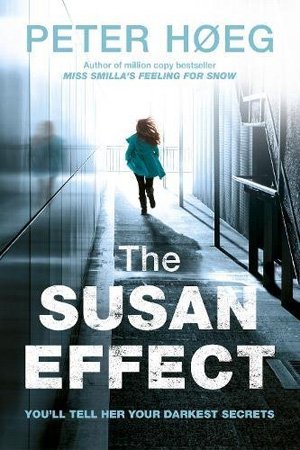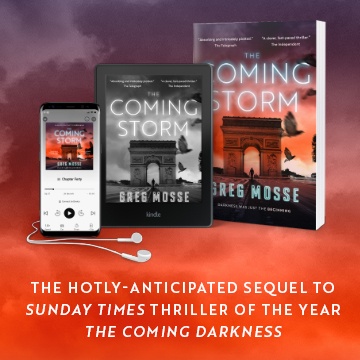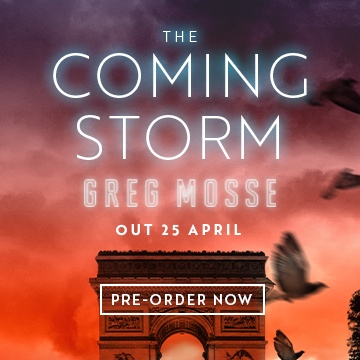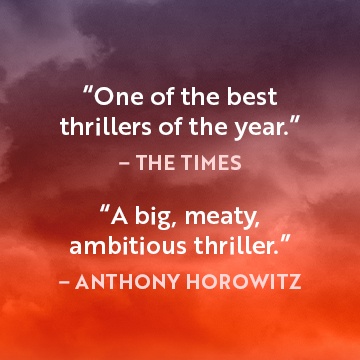 Written by Peter Hoeg, translated by Martin Aitken — Susan Svendsen and her family are away in India. Not together, mind you. Her husband, Laban, and twin boy and girl Harald and Thit, are there separately, and yet each member of the family is in trouble of one kind or another. Police, organised crime, a religious group – it’s complicated. Susan herself is being held for assaulting her former lover. Then a Danish government official called Hegn appears and extracts each of them from their various situations.
Written by Peter Hoeg, translated by Martin Aitken — Susan Svendsen and her family are away in India. Not together, mind you. Her husband, Laban, and twin boy and girl Harald and Thit, are there separately, and yet each member of the family is in trouble of one kind or another. Police, organised crime, a religious group – it’s complicated. Susan herself is being held for assaulting her former lover. Then a Danish government official called Hegn appears and extracts each of them from their various situations.
Like Smilla Jaspersen in Peter Hoeg’s triumphant, Glass Key-winning Miss Smilla’s Feeling for Snow, Susan has an academic background in physics and a special ability. It doesn’t involve snow, however. People who come into Susan’s presence experience an inexplicable desire to unburden themselves, and usually they find it impossible to lie. Her other skill is getting men into bed. In exchange for her family’s freedom, Hegn wants Susan to go and meet a woman who was part of a secret government initiative called the Future Commission and use her ‘effect’.
It seems simple enough. All she needs to do is visit Magrethe Spliid, and find out what the Future Commission concluded before it was disbanded. Taking teenage son Harald with her, Susan finds Magrethe’s workplace but is turned away. However, when they try to leave the facility, someone tries to kill Susan and Harald by crushing the family Volvo with a digger. They make a narrow escape but later on Susan receives a message from Magrethe proposing a secret meeting. The unveiling of the mystery behind just what the Future Commission was up to, and why Hegn wants to know, is set in motion.
The Susan Effect is billed as a thriller, but this book is more than that. It’s thoughtful, intricate and, quite frankly, peculiar. One minute, Susan will be secretively trying to infiltrate a government archive, discovering a dead body or dodging deadly blows from an assailant. A few pages later, she will ruminate on her role as a mother, her relationship with her Nobel-winning physics mentor, or her own sexuality. Then she’ll critique a piece of modern architecture, or poetically describe a blanket of snow or the still sea on a cold winter morning. Grafting buds onto an apple tree, cooking Christmas dinner – her expertise seems vast, and it gives the novel plenty of intellectual depth.
Someone is watching Susan and her family. What unfolds is a conspiracy in which the Future Commission only plays a part. Its former members are being eliminated one by one, and when Susan manages to find one alive, even with her ‘effect’ she finds out very little. There are hints that a James Bond-style villain might be behind it, with tendrils extending throughout the Danish political establishment, entwining the arts and academia. Naturally the security forces are involved too. If Susan doesn’t get to the bottom of it, an enormous injustice might take place. Despite her intelligence and her special ability, it’s a Susan and Goliath struggle.
Susan, Laban, Harald and Thit each display personal resilience, and Susan’s troubled past plays a role too. Copenhagen is living part of the story, as is the Danish countryside with its woods, marshes, islands and waters. There is hard-hitting insight in this book, about the environment and about how paper-thin Western democracies seem to be. There is brutal violence, and one particular adversary called Jason seems impervious to pain but truly enjoys inflicting it. And there is a touch of humour – sometimes thanks to Susan’s ‘effect’, or just because of the unusual characters Peter Hoeg throws into her path. Her husband, Laban, is a charismatic composer and often provides this levity.
This kind of esoteric writing won’t appeal to everyone. It might not even appeal to everyone who loves Scandinavian crime fiction. There are detours and diversions from the action and the main plotline that may frustrate you. Yet there’s an intelligence and philosophical quality to Peter Hoeg’s writing that puts him in a unique category with authors like Martin Cruz Smith and Donna Tartt.
Harvill Secker
Print/Kindle/iBook
£9.99
CFL Rating: 5 Stars









